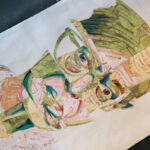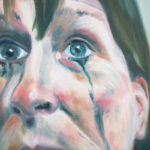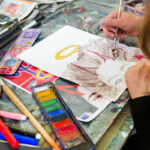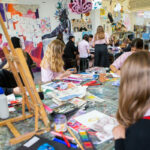Curriculum Vision and Intent
Our Art Department Curriculum is based around the ethos that Art Makes People Powerful. We develop artistudents as individuals learning to harness and enjoy creativity whilst also being able to make progress, meet expectations and understand the success criteria for Art as a subject. Our aims are as follows:
To provide an exceptional and inclusive Art education that ensures progress for all through a broad and balanced creative spiral curriculum. This is delivered through outstanding teaching and learning focused on technical skills and conceptual confidence. It encourages curiosity, and promotes our ethos that Art Makes People Powerful.
To develop all our learners into confident artistudents, who are critical and independent thinkers and compassionate agents for change. They are able to be successful creative individuals who benefit from and enjoy studying art, whilst also being able to meet the expectations of the subject to make good progress and get good results.
To develop a department team of artisteachers built on creative development, artistic practice, and with a focus on wellbeing, who model high expectations through a strong community of practice.
KS3 curriculum and assessment
KS3 Art is all about experience, enjoyment and developing creative skills. We want to ensure that even those students who do not pursue Art beyond year 9 gain a powerful and impactful Goodly Heritage from their experiences of art education. We want them to become confident, curious, critical and creative, and be able to apply the skills they have learnt to any context, but above all carry a love for the arts into the wider world. KS3 students do art presentations on self-selected topics, often peer critique their work, and are considered an important part of the curriculum designing process.
At KS3 students are set homework fortnightly, and work is assessed by staff and peer-assessed by other students.
Year 7: How to be a great Artistudent
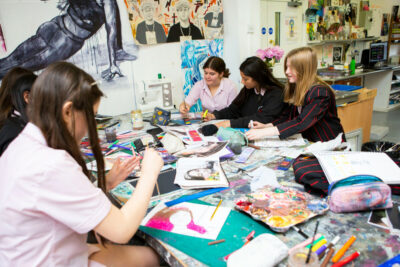 We start with an induction project, to give all our students the metacognitive skills to enjoy and flourish in Art. We aim to show students the structure of a genuine creative journey, how to tackle tasks and processes, and how to develop important characteristics as a successful art student.
We start with an induction project, to give all our students the metacognitive skills to enjoy and flourish in Art. We aim to show students the structure of a genuine creative journey, how to tackle tasks and processes, and how to develop important characteristics as a successful art student.
We then go on to explore a range of processes, media and techniques as well as developing social and conceptual skills. We explore working collaboratively, making tiles and casting inspired by Paolozzi.
We spend time exploring drawing from observation and the many ways this can be done, working with different scales, dimensions and materials.
We look at science fiction, and explore building a fictional but meaningful narrative through students’ own movie posters using photoshoots, model making and photoshop.
Year 8: Me, myself and I
In Year 8 we focus on helping our students find themselves in the art they experience and make. This helps students to feel seen and heard, and to be confident in making art that is personal, meaningful, and goes beyond a focus on aesthetics.
We start off exploring the self portrait, looking at fauvism and other art movements, with a focus on contemporary female artists. Students learn to design and tesselate their own patterns that symbolise their passions then paint on top of this, to make a layered painting.
We then move on to explore animation and moving image, making morphic self portraits using stop motion animation, and also explore a range of printing processes.
Year 9: Get Up Stand Up
In this year students move beyond their own context and immediate environment to make art about the wider world and larger topics and issues. This encourages students to make art that can change the world and gives them a sense of empowerment through creativity.
We start the year looking at a range of contemporary artworks, including public and socially engaged artists. Students explore how to combine media in interesting ways and make sophisticated and moving protest banners.
We then look at sculptural art and wearable art, through the works of art made for carnival parades, as a form of performance and celebration. Students look at carnivals from all around the world, design and make their own wearable sculptural pieces, and even get to perform with them as part of the documentation.
Students end Year 9 learning about the GCSE, doing an end of key stage creative task, and exploring the art of mural making as a way of sharing ideas, telling stories and bringing diverse communities together.
KS4 curriculum and assessment
Edexcel
60% Component 1 – Personal Portfolio
40% Component 2 – Externally set assignment, ending with a 10 hour two day final exam
GCSE Art is an exciting step up in students’ artistic development. Students are given more autonomy and ownership of their projects, and have more independence to make work that is personal and meaningful to them. We spend time ensuring students feel confident in their creative and analytical skills before starting a project.
Art is a fantastic accompaniment to other subjects, it complements critical and reflective thinking, provides an alternative set of skills to essay based subjects, and for many is a creative release during times of pressure and stress. Most importantly, it also diversifies students’ experiences and skills development, broadening their opportunities.
Year 10: A year of artistic exploration
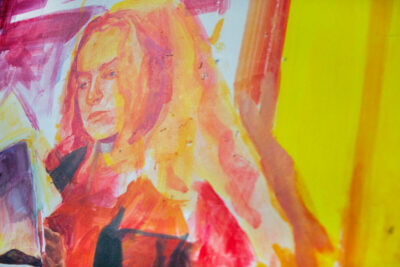
We start year 10 with a Key Stage 4 artistudent induction, where students learn about project structure, assessment objectives, and key creative and metacognitive skills to embrace in order to both enjoy and succeed in the subject.
We then do a coursework project entitled Connections, where students apply their own ideas and thoughts to what they have learnt.
Students have the opportunity to do a mock exam, visit galleries, attend online opportunities, do life drawing and have workshops with artists.
By the end of year 10 we aim for the students to have an identity and feel a part of a supportive community of practice. We also aim to develop independence in thought, creativity, and, most importantly, an ambition and ownership of their work.
Year 11
Students do a final Component 1 project, where they create a more ambitious and sophisticated project. This ends with a final mock exam around Christmas.
In the Spring Term students are set an external assignment, on a theme selected by Edexcel. This is developed over about ten weeks, ending in a final 10 hour creative exam.
KS5 curriculum and assessment
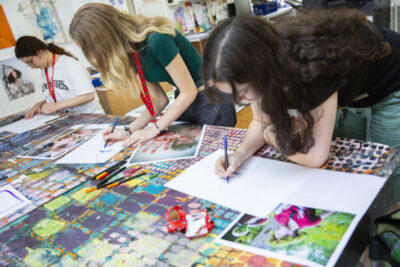
KS5 Art is an ambitious and exciting two years of study in which students can apply their previous learning to a mature, individual and highly developed body of work as young artists. The A level has many similarities to an Art Foundation or studio based Degree. We teach art as life skills, far beyond the solitary painter, able to apply their skills to any creative industry. Our aim is for all the students to learn important creative and professional skills they can apply to life beyond school in a range of contexts or directions.
Year 12: A year of creative discovery
We Start year 12 with an Artistudent Induction, learning important metacognitive skills, the structure of A level projects and how to best achieve against the assessment objectives. We also explore key phases of the genuine creative journey.
Students then apply these skills to their first project entitled Palimpsest, starting with a series of process workshops. This encourages students to prioritise the process and ideas’ development over the finished final outcome.
At the end of the year students start their Personal Project, starting with a Personal investigation, an essay exploring a topic of their choice. We visit many galleries, and have talks and workshops with artists from a range of creative industries to give a range of contexts to art as a subject.
Extra and super-curricular opportunities
We offer a range of extra curricular opportunities in the Art Department. We offer Art clubs at every key stage, and extra studio time for KS4 and 5 students once a week if they need extra support. The studios are always open to students if they want to come and work in a calm environment at break or lunch.
We run life drawing, oil painting club, and invite artists and ex students in to give talks and workshops about their practice and careers.
We go on lots of trips, and utilise the fantastic city we live in to see art at a range of galleries, and undertake drawing and photography in a range of environments.
Future opportunities (careers, university courses)
We encourage our A level students to apply for an Art Foundation course. Many courses are free, diagnostic one year programs where students can learn about a range of creative subjects and career routes, develop portfolios and then apply for BA degrees.It is a sociable and exciting year of study. Sometimes students who may not go on to study a creative subject for BA still benefit a great deal from doing Art Foundation.
Other BA degrees we support student with include Architecture, Fine Art, Design, engineering and Fashion.

